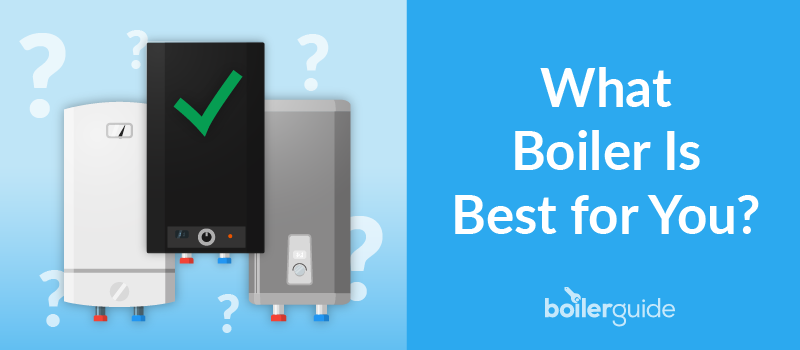Types of Boilers Explained: Combi, System & Regular (2025)
- There are three main boiler types, each suitable for different-sized homes, with various hot water demands.
- Combi boilers are compact units that are best for homes with up to 2 bathrooms. System boilers, however, can provide larger quantities of hot water for homes with more than 2 bathrooms.
- Regular boilers are only recommended where a direct replacement is needed, as they are the most expensive to install.
- If your boiler is struggling to meet your demand, it might be time to switch boiler type.
Understanding your heating needs starts with knowing your boiler. In this article, we'll guide you through the 3 main types (combi, system, and regular) to discover their advantages and disadvantages to find the perfect fit.
If you already know what type of boiler you need, it's important you find a qualified installer for the job – this is where we can help.
Avoid spending hours researching and reading reviews, instead, fill in our 30-second form, and you'll get up to 3 free quotes from local qualified installers.
It's quick with no obligations attached. Just click below to get started!
Get your best deal
Quickly compare 3 FREE quotes
- Quotes from local engineers
- Get quotes today, installed tomorrow
- Finance options available
- Save up to £500 on installation
- Quotes from local engineers
- Get quotes today, installed tomorrow
- Finance options available
- Save up to £500 on installation

1,8 million quotes provided in 10 years
See more reviews:
Different boiler types: The 3 most common boiler types in the UK
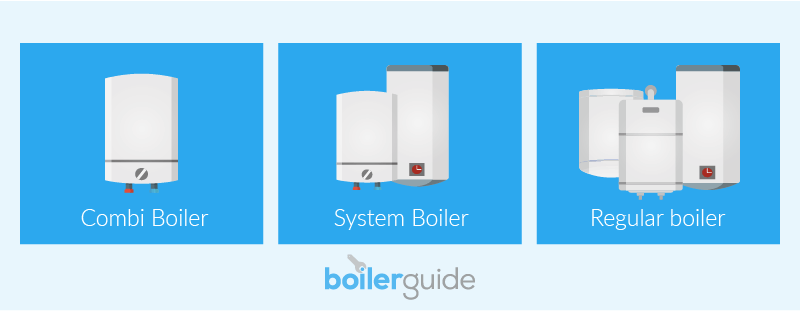
The three main types of boilers in the UK are:
- Combi boilers
- System boilers
- Regular boilers
Each type works in a unique way to provide homes with different levels of heating and hot water output, depending on their needs.
Each boiler type is available in various output sizes (this determines how powerful it is), fuel options and brands.
Typically, combi, system, and regular boilers are all widely available types of gas boilers. However, if you're looking for an alternative fuel, such as oil, LPG, electric, or biomass, your options may be different. For example, electric boilers are more frequently found in combi models, with fewer options for system or regular models.
These different types of boilers each have their pros and cons, so let’s break them down. In the following sections, we'll look at the boiler types explained by the homes they're best for and help you weigh up your options.
Combi boilers
A combi boiler, also known as a combination boiler, is highly efficient and compact, making it ideal for small to medium-sized homes with between 10 to 15 radiators and less than 2 bathrooms.
The name 'combi' refers to the fact that these boilers can heat water for use in central heating and your taps/outlets, all from one single unit ('combining' functionalities). Thanks to their space-saving features, combi boilers are one of the most popular choices in the UK – accounting for over half of the domestic new boiler installations each year (USwitch).
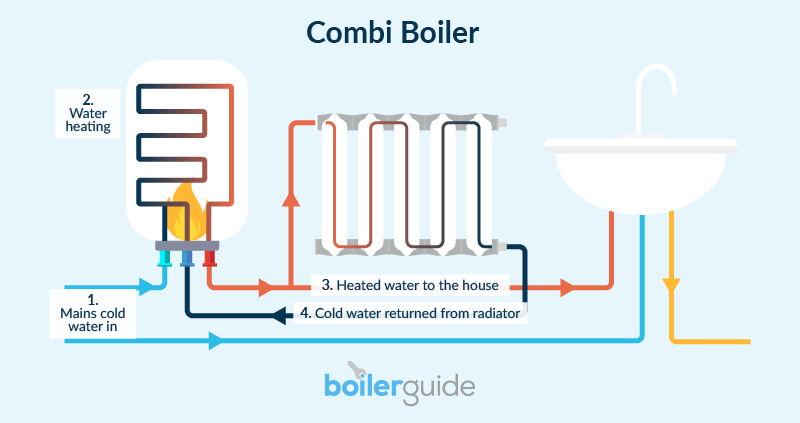
Combi boilers heat water directly from your mains supply, meaning they don't need any extra elements, such as a hot water storage cylinder or cold water feed tank.
This makes them ideal for small or medium-sized properties that have limited storage or loft space.. This heating method also makes them very energy efficient and affordable to run, as water is heated for use on demand (and not stored).
While combi boilers have some great advantages, there are also considerations you should make before going ahead with an installation.
| Combi boiler pros and cons | |
|---|---|
| Pros | Cons |
| Space saving | Requires good water pressure |
| High energy efficiency up to 94% | Unable to serve homes with 2+ bathrooms |
| Quick installation (lower costs) | No backup water supply |
| Hot water on demand | |
Advantages of a combi boiler
- Space-saving:
Combi boilers are single, compact units designed to fit into the space of a standard kitchen cupboard. On average, their dimensions are 700 mm (height) x 400 mm (width) x 300 mm (depth). This makes them ideal for any home that is low on space. - Highly efficient:
Most modern gas combi boilers have an efficiency rating between 92% and 94%, which means that per unit of fuel, up to 94% of it is converted into usable heat. By comparison, an old boiler may be only 70% efficient, meaning 30% of fuel used, is wasted. This high efficiency also means you save on energy bills when upgrading, as less fuel is consumed to provide the same heat levels your used to. - Quick and cheaper installation:
Combi boilers come in one simple unit and, therefore, do not require complex rewiring of piping during installation. This makes the job quicker and more straightforward, which can reduce labour time and your overall combi boiler costs. For example, replacing an old combi boiler with a new one can take between 4-6 hours, whereas a system or regular boiler can take 2 – 3 days. With labour rates at approximately £300 – £500 per day, this can really add up (that's £300 vs £900 at the lower end). - Hot water on demand:
Combi boilers operate on an "on-demand" basis, which allows them to produce hot water instantly as opposed to storing it for future use. This can be especially useful in facilities with long queues for hot water.
Disadvantages of a combi boiler
- Requires good water pressure:
Combi boilers can only provide the same water pressure as your local area. Therefore, if your area has weak water pressure (i.e. your water doesn't flow quickly or with much power), a combi will not be able to improve this. These boilers work best in areas with a good level of water pressure. They are also unsuitable for power showers for this reason.
Good to Know
You can test your pressure using a water pressure gauge
('good' is anything between 2 and 4 bar; below 1 is considered 'low').
You can also identify good water pressure if your taps and showers deliver a strong, steady flow of water; appliances like washing machines fill quickly. Whereas low pressure may be indicated by a drop in flow when multiple outlets are used simultaneously.
- Unable to serve homes with 2+ bathrooms:
Homes that have multiple bathrooms may need a higher capacity boiler type. Combi boilers cannot produce enough water for those with 2 or more bathrooms, as they can't adequately serve several outlets at once. If you require a higher water supply, you may find a system boiler more suitable. Find out more about the differences in our combi boiler vs system boiler guide. - No backup water supply:
As combi boilers deliver hot water on demand, there is no backup supply to rely on if you encounter a breakdown or a power outage.
System boilers
A system boiler is perfect for medium to large homes with high hot water demand, such as those with 2+ bathrooms and up to 20 radiators.
They work by receiving cold water directly from the mains, heating it, and transferring it to an unvented hot water storage cylinder for storage until it is needed.
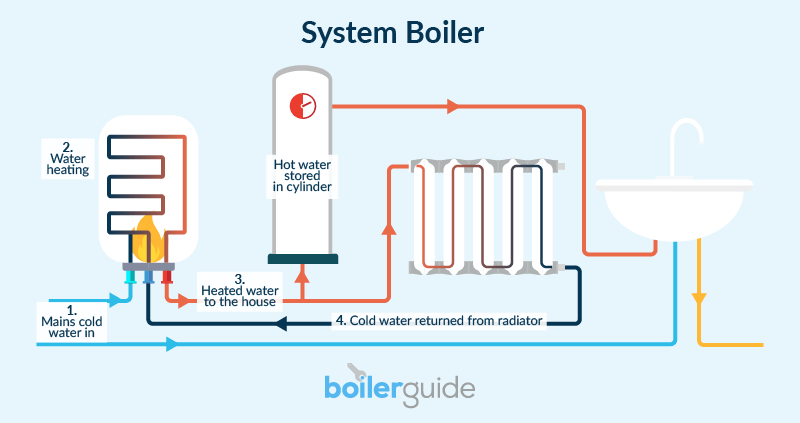
System boilers also have a built-in expansion vessel that contains air and water derived from the central heating system. This component maintains the right level of pressure in the system, allowing the boiler to take on higher capacities than combi boilers.
| System boiler pros and cons | |
|---|---|
| Pros | Cons |
| Ideal for medium-large homes | Stored water can require reheating |
| Hot water storage | Cylinders take up space |
| Stronger water pressure | No backup water supply |
| Hot water on demand | Refilling the hot water cylinder takes time |
Advantages of a system boiler
- Ideal for medium-large homes:
System boilers can easily serve homes with multiple bathrooms and up to 20 radiators (depending on output size). - Hot water storage:
These systems can store a large amount of hot water within the accompanying cylinder. As long as the cylinder retains heat, instant hot water is available on demand throughout the home. - Stronger water pressure:
If your property suffers from low water pressure, a system boiler could help improve this. System boilers use mains water and store it under pressure in the cylinder, allowing them to provide strong and consistent hot water pressure throughout the home.
Disadvantages of a system boiler
- Stored water can require reheating:
As water is stored, it can lose heat over time, requiring more energy to reheat it. Ensuring the cylinder is well insulated can combat this, but may add to costs. Alternatively, an electrical immersion heater can be fitted within the cylinder to act as a backup to ensure you always have hot water. - Cylinders can take up space:
You will need an empty airing cupboard or utility space to store a hot water cylinder (something smaller homes don’t usually have). On average, a hot water cylinder is approximately 1 – 1.5 meters tall, with a diameter of 450 – 700mm. This is roughly the same footprint as a washing machine, standing around chest height for an adult. - Refilling the hot water cylinder takes time:
Depending on the size of your cylinder, it can take between 20 minutes to an hour for it to refill once it's empty. Therefore, you may need to plan ahead to make sure you have sufficient hot water if you're planning to run a bath!
Regular boilers
Also known as conventional or heat only boilers, regular boiler systems consist of several parts including a boiler, a cold water feed and expansion tank and a hot water storage cylinder.
Regular boilers are the oldest boiler type and are now being replaced by the system boiler. Both types can provide large quantities of hot water on demand for homes with multiple bathrooms and up to 20 bathrooms. However, the system boiler takes up much less room and is quicker (and cheaper to install).
This is largely due to the many parts needed in a regular boiler set-up.
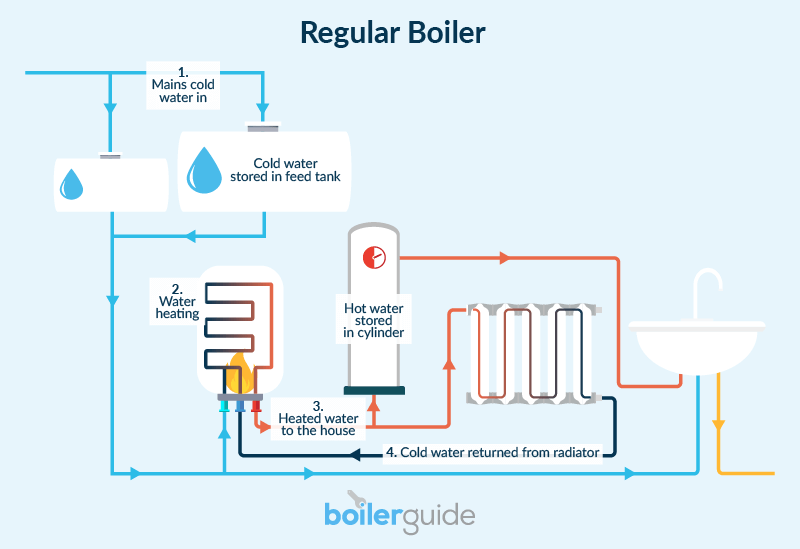
Two tanks, located in the loft, feed the regular boiler system. The first of these, the cold water feed tank, draws cold water from the mains supply. The second one, known as the expansion tank, loads the boiler system and acts as an overflow for any water that expands in the system after being heated.
The boiler then heats up the water which is then stored in a hot water cylinder until it is needed for radiators or domestic use.
| Regular boiler pros and cons | |
|---|---|
| Pros | Cons |
| Back-up water heating | Regular boilers take up a lot of space |
| Compatible with old heating systems | Heat loss |
| Can be compatible with solar | Complex installation |
Advantages of a regular boiler
- Back-up water heating:
A regular boiler can be equipped with an immersion heater within its separate hot water tank, which can continue to provide hot water even if the boiler breaks down. - Compatible with old heating systems:
New regular boiler models can be a solid option for older homes without modern amenities, making them a cheaper option than renovations. - Potentially compatible with solar:
Modern regular boilers are also compatible with solar thermal panels. For those with an existing regular boiler, this can present an added opportunity to enhance your home’s energy efficiency and reduce overall energy costs by £110 – £200 per year (Energy Saving Trust).
Disadvantages of a regular boiler
- Regular boiler systems take up space:
With more components than any other boiler type, you will need lots of extra space. You will need a cupboard or utility space for the boiler unit, an airing cupboard for the hot water cylinder and enough loft space for two cold water tanks (roughly the size of one large suitcase and a small bathtub!). - Heat loss:
Without proper insulation, your water cylinder will lose heat. Regular boilers can take up to an hour to reheat and provide hot water once the heat is lost. - Installation can be complicated:
Choosing to switch to a regular boiler, from a combi or system boiler, can be a very complex and costly installation. This is because fitting additional components requires new pipework and takes time, leading to increased labour costs. This is why regular boilers are only recommended as a direct replacement for an existing one, where pipework is already in place.
If you're ready to update your heating system with a brand new boiler, we can help. Finding qualified, trustworthy installers can be a struggle on your own, taking up hours of your free time by googling and checking reviews.
Dodge all the hassle and simply complete our 30-second form. We'll connect you with up to 3 local installers who will offer you quotes to compare.
It's completely free, with no obligations. Just click the button below to begin!
Get your best deal
Quickly compare 3 FREE quotes
- Quotes from local engineers
- Get quotes today, installed tomorrow
- Finance options available
- Save up to £500 on installation
- Quotes from local engineers
- Get quotes today, installed tomorrow
- Finance options available
- Save up to £500 on installation

1,8 million quotes provided in 10 years
See more reviews:
What are condensing & non-condensing boilers?
During the process of burning fuels, such as gas and oil, inside a boiler, water vapour is produced. This vapour contains heat, which in a non-condensing boiler is left to escape with waste gases through the flue pipe.
However, since 2005, all new boilers are required by law to be 'condensing'. Condensing technology captures and recycles the heat from this water vapour within the boiler (before it can escape), so it can be used again within the heating process.
Condensing boilers are therefore much more efficient than non-condensing boilers, as more of the heat they produce is saved. In a non-condensing boiler, up to 30% of the heat produced is lost through the flue pipe.
Condensing technology has enabled new boilers to achieve high efficiency levels of above 90%, which directly reduces your energy use and lowers annual bills. For example, a new condensing boiler could save you up to £490 a year, compared to an old, non-condensing boiler that's less than 70% efficient.
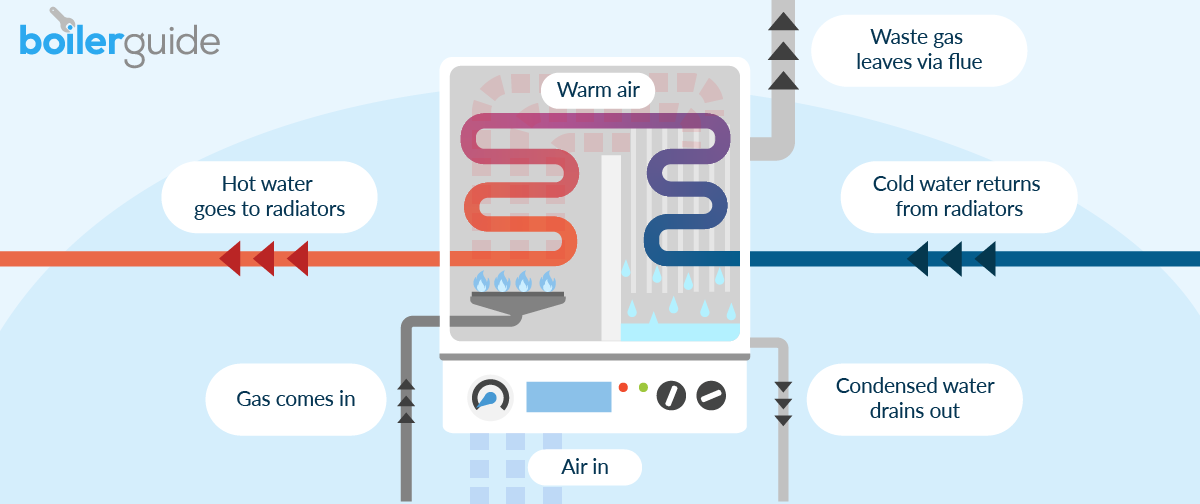 How a condensing boiler works
How a condensing boiler works
Which boiler type is the best for my home?
There are a few key points to consider which will help you understand which boiler type is best for your home’s needs.
- Your hot water demand
If you have more than 2 bathrooms, or between 10 – 20 radiators, you'll need a system boiler. However, if you have less than 2 bathrooms and less than 10 radiators, a combi boiler is the perfect option. - Your existing set-up
If you're happy with your hot water supply, your current boiler is likely the right fit. However, if it's struggling to serve multiple taps at once (or you've recently added a new bathroom), you might need to switch to a boiler with a larger capacity – such as a system boiler, or a higher output combi (it's best to consult an engineer for the exact size your home requires).This is also true if you're suffering with water pressure issues – a combi cannot improve your pressure, however, a system or regular boiler can make it stronger. - Space
Another big consideration – if you don't have storage space for extra tanks and cylinders, a combi boiler is the best option. However, if you need more hot water but don't have the space, you can consider options like a storage combi (which combines a combi with an inbuilt hot water storage cylinder). - Upgrading your existing boiler
You may also want to do a simple like-for-like upgrade if your boiler has become inefficient (i.e. your bills are much higher for no known reason, or it's breaking down frequently).
If you're still unsure which boiler type is most suitable for your needs, though, try our decision tree!
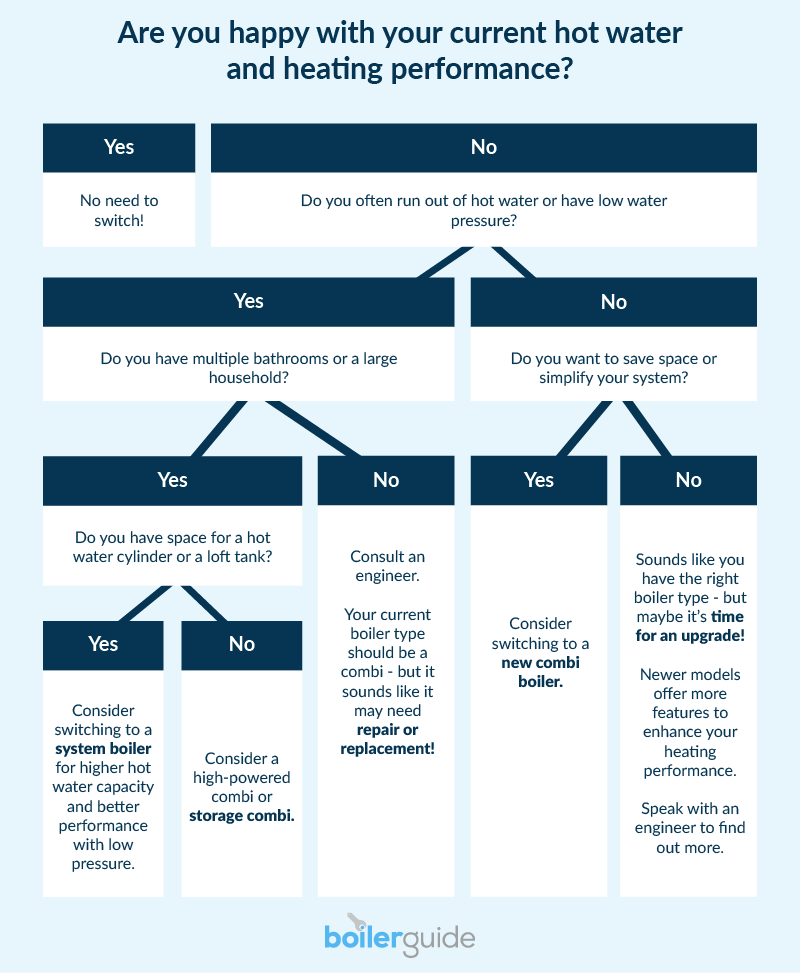
Results summary
| Scenario | Consider switching to | Why |
|---|---|---|
| Small home, one bathroom, good water pressure | Combi boiler | Space-saving, instant hot water |
| Large home, multiple bathrooms | System or regular boiler* | Handles high hot water demand |
| Low water pressure | Regular boiler* | Works with feed tanks in loft, which can improve pressure |
| Need to save space or remove tanks | Combi boiler | No tanks or cylinders required |
*Only recommended in a like-for-like replacement scenario, otherwise, costs can be very high.
Always assess your household's current and future hot water needs, available space, and water pressure before switching boiler types. Consult a qualified heating engineer for tailored advice.
Should you switch boilers?
Switching boilers can be expensive, depending on your home’s setup. To help you understand these costs, we've outlined some estimates below for different boiler swap situations.
| Prices per boiler switch | ||
|---|---|---|
| Type of switch | Price range (Incl. installation) |
Average total |
| Combi to system | £1,600 – £6,500 | £4,050 |
| Combi to regular | £1,600 – £7,000 | £4,300 |
| System to combi | £1,550 – £4,500 | £3,025 |
| System to regular | £1,600 – £5,000 | £3,300 |
| Regular to combi | £1,600 – £6,500 | £4,050 |
| Regular to system | £1,600 – £5,500 | £3,550 |
| Combi to system | £1,600 – £6,500 | £4,050 |
Prices are estimates only and are subject to change. Always consult an installer for accurate price quotes.
Depending on your needs, costs will vary for each swap, this is to account for additional factors such as removing the old boiler, upgrading pipe work or fitting new tanks/cylinders.
Like-for-like replacements will always be your cheapest option, but if your boiler isn't meeting your needs, switching to a new type is the most efficient and cheapest solution long-term (as you'll avoid breakdowns and constant repairs).
In addition, new boilers last anywhere from 10-20 years while also decreasing the risk of issues, such as system failure. Switching can also be less expensive in the long run as constant repairs can eventually overtake the new boiler cost and newly installed boilers have a far higher rate of energy efficiency (at least 92%).
Find trusted boiler installers in the UK near you
If you’ve decided what type of boiler you need and you’d like some help navigating the market, you can get free, non-binding quotes from 3 qualified installers in your area.
Avoid the stress of searching the web and doom scrolling through reviews and take just 3 simple steps to get your new boiler today!
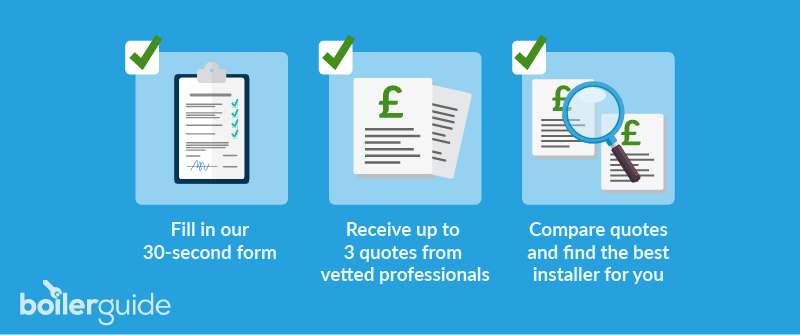
Just click the button below to get started.
Get your best deal
Quickly compare 3 FREE quotes
- Quotes from local engineers
- Get quotes today, installed tomorrow
- Finance options available
- Save up to £500 on installation
- Quotes from local engineers
- Get quotes today, installed tomorrow
- Finance options available
- Save up to £500 on installation

1,8 million quotes provided in 10 years
See more reviews:
FAQ
What are the 3 types of boilers?
Combi boilers, system boilers, and regular boilers are the 3 most prominent types of boilers. All of these boilers have their own pros and cons.
What is the most common type of boiler?
Combi boilers are the most common type of boilers in the UK, especially for small to medium sized homes. This type of boiler has many advantages that make it a popular choice.
What is the best type of boiler in the UK?
Combi boilers are the most popular type of boiler and do well in smaller households but gas boilers can be the most effective fuel type. Overall, the best type of boiler for your needs can vary based on different factors.




